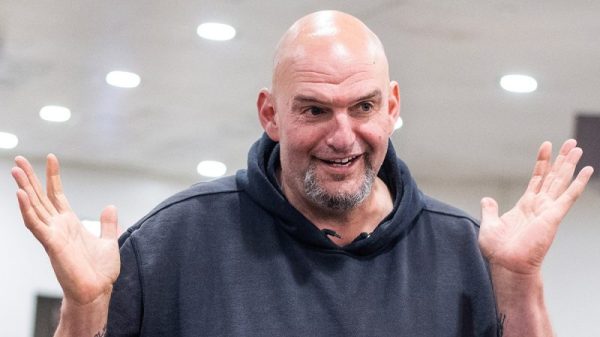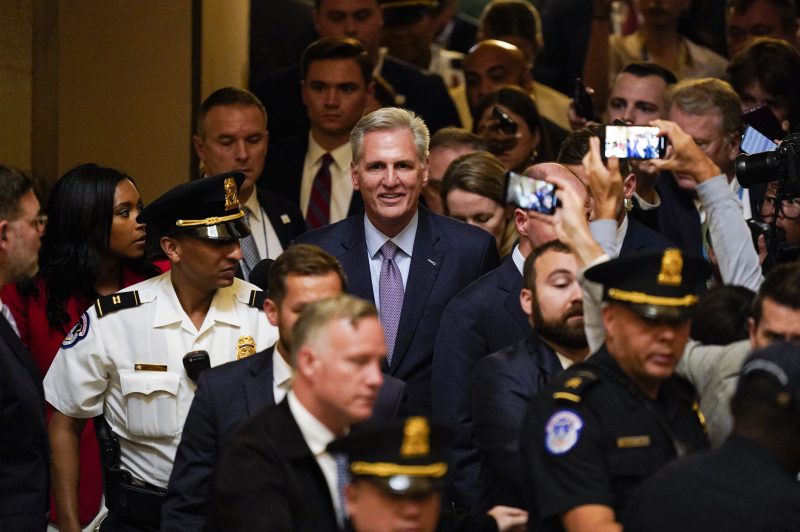On April 15, 2009, John A. Boehner visited his friend Kevin McCarthy in his hometown, Bakersfield, Calif., where they decided to wander into one of the first tea party rallies ever held. They didn’t speak, just observed, and then they reported back to their cohorts in Washington that something was brewing.
Then-House Minority Leader Boehner (R-Ohio) deputized McCarthy (R-Calif.) to recruit candidates for what would become a historic class of 2010, and the 44-year-old in just his second term in the House set out to find the anti-politician candidates who met that populist movement: three car dealers, six doctors, funeral home directors, an MTV reality show star, an NFL all-pro lineman and — possibly his favorite of all — a gospel-singing farmer from Frog Jump, Tenn.
“You get enough people on their surfboards, you send them in the right direction and see how many can get to shore,” McCarthy told The Washington Post in a January 2010 interview.
More than 85 political surfers made it to shore in the November 2010 elections that put Republicans in charge — a political wave that elevated Boehner to House speaker; Eric Cantor (Va.) to majority leader; and McCarthy to majority whip. Their friend, Paul D. Ryan (Wis.), became the top policy wizard as chair of the House Budget Committee.
Kevin McCarthy ousted as speaker
End of carousel
Less than 13 years later, all four had been devoured by the very forces they helped launch. One by one, each got booted out of office by rabble-rousing disrupters who, after first taking flight in 2010, came to dominate national Republican politics following Donald Trump’s ascendancy to the White House in 2017.
McCarthy — the tactician who was the least substantive of the quartet — managed to last the longest, until Tuesday. A small band of GOP rebels linked arms with Democrats to oust him as House speaker, the first time in U.S. history that a sitting speaker had been expelled through the obscure motion to vacate.
McCarthy and his self-branded “Young Gun” cohorts, Cantor and Ryan, tried to breed a new generation of conservatives. Boehner, by contrast, tried to steer them all toward achievable, albeit somewhat incremental, conservative wins at a time when Democrats controlled the Senate and the White House. Rather than working their way up the ranks to become subcommittee chairs, this brash new generation found the limelight on social media and in conservative news outlets that didn’t exist 20 years ago.
Boehner — who arrived in Congress in 1991 as a backbench bomb-thrower — quickly found an incentive structure that rewarded more studious and grounded action. By last January, after McCarthy needed 15 ballots to claim the speaker’s gavel, the incentives all skewed the opposite direction.
And Tuesday, eight Republicans, most hailing from deep conservative district where voters loath the establishment, assumed they would be rewarded in a primary for ousting a GOP leader who fits the label of career politician.
“I’m not quite sure those individuals are looking to be productive. It concerns me as a Republican based upon watching what they do. I want to be a Republican and a conservative that governs,” McCarthy told reporters at a free-flowing, sometimes rambling 46-minute news conference late Tuesday.
Just look at Reps. Lauren Boebert (Colo.) and Marjorie Taylor Greene (Ga.), both of whom never held any political office until January 2021. Boebert had previously been a bar owner in western Colorado. Greene owned a CrossFit gym in northern Georgia.
Boebert has 2.9 million followers on X, formerly Twitter, while Greene has 2.7 million followers. The former speaker managed 2.8 million followers, about the same as two relative newcomers who would have been gadflies in a different era of Congress, if they even got elected.
Instead, Boebert and Greene got into a loud, expletive-laced shouting match on the House floor in June over who deserved more credit for trying to impeach President Biden. Boebert forced a vote, temporarily sidelining the effort, but Greene used her close ties to McCarthy to force him into announcing an impeachment inquiry last month that so far is off to a slow start and has not uncovered any direct evidence of Biden misdeeds.
“I just think we live in a different era altogether. I’m not a sociologist, but I think we live in a different era all around,” Rep. Mario Diaz-Balart (R-Fla.) said in an interview after Tuesday’s tumultuous vote.
Diaz-Balart first won office, to the Florida state House, in 1988, worked his way to the state Senate in 1992 and, after winning a House seat in 2002, eventually became a prominent member of the House Appropriations Committee, overseeing the State Department’s budget.
It’s the old-fashioned route to power that has gone quite out of vogue in today’s politics. And while he argued that Democrats have similar issues with young liberal stars in their caucus, Diaz-Balart acknowledged that the House GOP is its own unusual beast.
“Republicans tend to be a lot more independent-minded than Democrats,” he said.
Chaos among House Republicans now can be considered a feature of their governance, not a bug.
Over the last 30 years, Democrats have had the House majority for about a decade. The federal government has never shut down on their watch. They have had two House speakers, the late Tom Foley (D-Wash.) in 1993 to 1994 and Nancy Pelosi (D-Calif.) for two stints.
The House Republican majority from 1995 through 2006 had just two speakers, with one series of government shutdowns.
Boehner lasted a little less than five years as speaker, overseeing a 16-day shutdown in 2013, while Ryan made it a little more than three years as speaker. A 34-day shutdown launched as he left Congress at the end of 2018.
McCarthy did not make it nine full months as speaker and got voted out after refusing to shut down the government by working with Democrats to pass a bipartisan funding bill. A shutdown could start in mid-November unless the next GOP speaker can work in bipartisan talks without fear of losing the gavel.
McCarthy’s allies often blame the incredibly narrow majority for his problems, starting the year with 222 Republicans and 213 Democrats.
But there’s nothing unique about such narrow majorities. Pelosi had the same margin in 2021 and 2022, and moreover, the GOP majority also had long stretches from 1999 through 2002 when they also had exactly 222 members in their caucus.
Over that four-year span, with a more powerful leadership team, Republicans lost just two procedural votes known as the rule. McCarthy lost two rule votes in back-to-back weeks last month, making three total since June.
The old GOP leaders devoted most of their time toward bills that would boost their members in tough political districts and did not cater to those from safe Republican strongholds.
“We ran our caucus to basically support members in swing districts. That’s how we got power,” said Tom Davis, the former Northern Virginia lawmaker who served as top GOP campaign strategist in the 2000 and 2002 elections. “Today, they run the caucus now to protect members from R+30 districts to protect them in primaries.”
A glance at the House legislative schedule in September backed this up, as McCarthy bowed to right-wing lawmakers again by forcing his committee chairs to write very conservative legislation to appease the hard-line wing.
He regularly forced swing-district Republicans, including 18 of whom hail from districts that favored Biden in 2000, to vote for legislation that had no chance of becoming law and, in some cases, still did not mollify the far right and lost on the House floor.
Of the hundreds of amendments the House considered last month, the overwhelming majority came from members of the Freedom Caucus and other similarly aligned far-right conservatives, rather than from working with those on the political front lines to craft amendments that would help them in their swing districts.
“This place has changed dramatically. Cable networks and social media have just created opportunities for those who originally would have been kind of waiting their time and working their way up in a structure where a speaker was important,” Sen. Jerry Moran (R-Kan.) said Wednesday.
After eight years in the Kansas state Senate, Moran arrived in Washington in 1997 as a House freshman. He took a seat on the House Agriculture and Transportation committees, key panels for steering resources back to his sprawling rural district.
In 2010, Moran ran for the Senate and took on several difficult jobs. He now serves as the top Republican on the Veterans’ Affairs Committee.
His replacement in the House, Tim Huelskamp, joined that massive House GOP class of 2010 and took the opposite path of Moran.
He devoted most of his time to working against Boehner, Cantor and McCarthy, so much so that in late 2012, they kicked him off the critical Agriculture Committee.
He told Roll Call at the time that he asked participants in a telephone town hall whether he should vote for Boehner for speaker in January 2013. “It was 12 percent,” he said.
Rather than cower in fear from losing his key committee spot, Huelskamp helped lead a failed coup attempt against Boehner. In 2015, he helped launch the Freedom Caucus, whose members drove Boehner into resignation in October 2015.
Facing a similar dilemma as McCarthy, Boehner decided to retire rather than force his members to vote on the so-called motion to vacate.
McCarthy initially got anointed as Boehner’s successor, but the same hard-right elements snuffed out his bid, leaving Ryan as the only Republican capable of winning the necessary votes.
By the time Ryan departed in late 2018, his relationship with President Donald Trump was in tatters, a large number of Freedom Caucus members despised him, and the GOP had been dumped into the minority.
That allowed McCarthy to become minority leader in January 2019, a post that can be won on an internal secret ballot without the requirement of winning a public floor vote like House speaker does.
He made peace with several staunch conservatives, such as Rep. Jim Jordan (Ohio), and he stuck close to Trump as he headed into the 2020 campaign. In a 2019 interview during a GOP retreat in Baltimore, McCarthy accurately predicted that “socialism vs. freedom” would be a winning message in the campaigns, boosting candidates who railed against liberal drift.
Unexpectedly, House Republicans won 11 seats on Election Day 2020, when Biden won the popular vote by more than 7 million votes. That placed McCarthy at 213 seats, a handful away from the majority, and rather than ditching Trump after he inspired the 2021 Capitol attack, he embraced him in the belief that Republicans needed his supporters to turn out in the 2022 elections.
Those Trump backers were, essentially, the same type of voters who were in Bakersfield at the 2009 tea party rally. “The people participating in these protests will be the soldiers for our cause a year from now,” Boehner told GOP leaders after that event.
It came in one of many accounts he and McCarthy have told over the years, meant as an apocryphal moment where they realized they could ride this political bull to power.
But that movement did not want to hear from them. As one local account of the 2009 rally reported, they were prohibited from speaking in front of the 2,5000 attendees.
McCarthy went on to find the candidates who met that moment and won the majority, but they also set off a political wildfire that is still raging.
“I believe in bringing new blood up and helping them,” McCarthy said at the conclusion of Tuesday’s news conference. “And I want to help them all the way.”
Too many members of the new blood did not return the favor.







































